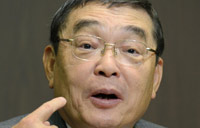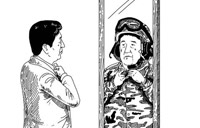Media reports said the NHK chief is believed to be close to Japanese Prime Minister Shinzo Abe, who has repeatedly called for revising Japan's postwar pacifist Constitution to allow a Japanese military buildup.
Nobuo Ikeda, a professor at Jobu University in Japan's Gunma prefecture and a former NHK correspondent, said Abe probably aimed to use NHK for publicity overseas.
But "the president and board members cannot and should not exert influence upon the field operations" of NHK, Ikeda said in a recent article.
|
 |
| World media criticize NHK remarks |
|
 |
| China slams NHK's denial of Nanjing massacre |
Liu Jiangyong, a professor of Japanese studies at Tsinghua University in Beijing, said Abe and his followers in the NHK are challenging Washington's outlook on history and World War II, and their inflammatory remarks "have irritated the US".
"Obviously, the Japanese Cabinet has not followed suggestions from Washington to refrain from provocation and repair the strained relationships with China and South Korea. Washington has to place Abe's persistence in check," Liu said.
Adding to the controversy, Naoki Hyakuta, a best-selling author on Japan's kamikaze fighter pilots and an NHK governor, said this month that the 1937 Nanjing Massacre — committed by the invading Japanese army — "never happened", and that the United States staged the postwar trial of Japanese leaders to cover up its own war crimes.
A US embassy spokesman responded sharply, telling Time magazine: "These suggestions are preposterous. We hope that people in positions of responsibility in Japan and elsewhere would seek to avoid comments that inflame tensions in the region."
Jackson Diehl of The Washington Post wrote in a column on Monday that Abe is leading Japan "into one of those dynamic and potentially dangerous eras".
"Abe has appeared to pivot toward the hard-line nationalism that has always been an element of his political makeup. He has managed to set off alarm bells not only in predictable places — China and South Korea — but inside the very US administration he hoped to partner with."